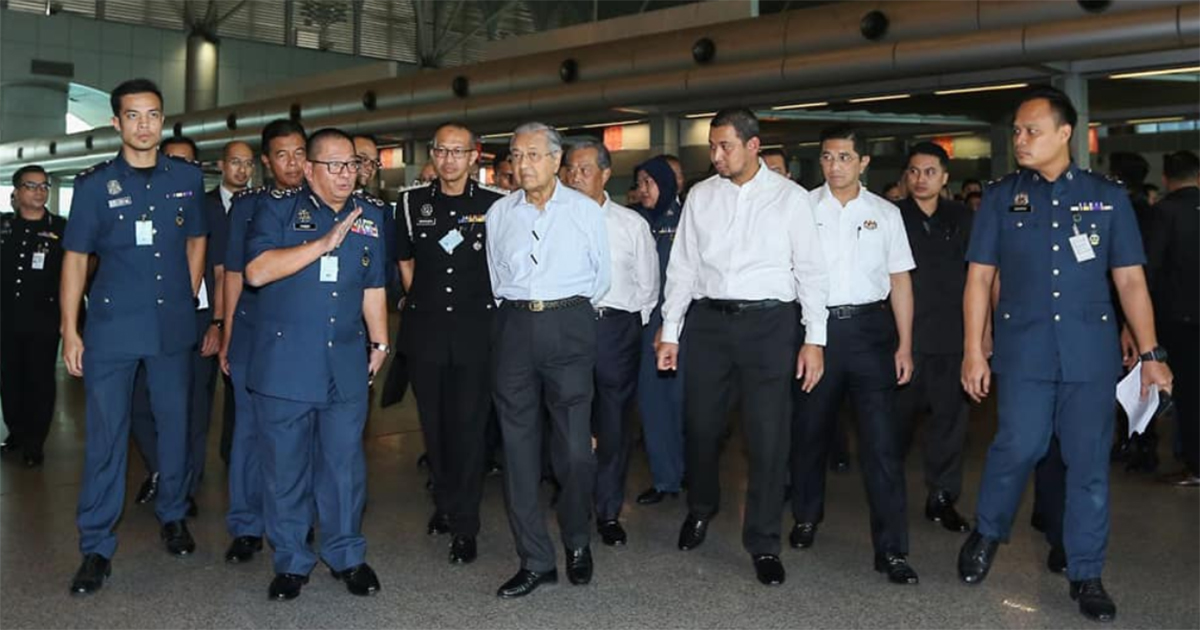Mahathir Mohamad is at it again.
The Malaysia Prime Minister rattled off a string of quotable quotes on Oct. 31 after he confirmed that Malaysia will proceed with the construction of the Johor Bahru-Singapore Rapid Transport System (RTS).
However, based on his comments as reported by Bernama, Mahathir appears to have reservations about the RTS going ahead despite the green light being given.
His comments lumped at least two separate issues together: Singapore not wanting to build a new bridge, as well as Singapore buying supposedly subsidised water from Malaysia over the years, which has been his pet topic.
Doesn't understand Singapore's reluctance
Speaking to reporters after visiting the Sultan Iskandar Customs, Immigration and Quarantine Complex (CIQ), Mahathir said he does not understand Singapore's reluctance with building a new bridge to solve the long-standing congestion problem at the Johor Causeway.
He said the building of the RTS would only ease the congestion at the Causeway, not eradicate it.
Mahathir said: “You just see, we are willing to sacrifice money to support Singapore so that they can buy cheap water for themselves but when we want to build a bridge to solve the traffic problem, they refuse to have the bridge... I don’t know why."
Mahathir even provided a prophecy.
He added: “In the year 3000, I will not be around. By that time, there will be 100 million people in Johor wanting to go to Singapore. Still there will be no new bridge, so I don’t see how we can be so accommodating to Singapore with Singapore not accommodating us.”
Why RTS won't work completely well
Mahathir also appeared to voice the concerns of his Malaysian constituency, as he said the RTS will make it impossible for many commuters from Johor Bahru who use motorcycles to travel to and from Singapore.
He said that improving efficiency at the CIQ would not be able to fully solve the congestion issue, especially during weekends and festival periods, including Hari Raya.
“We have some ideas to reduce congestion at this building but it’s not adequate. When it comes to festival seasons and weekends, we will continue to face jams," he said.
“We may improve efficiency but as long as there is no bridge, we will not be able to solve the problems at the Johor Causeway.”
Water issue
Mahathir then pivoted to the water price issue again, but this time, tying it to the land bridge issue.
He said Singapore did not want a new land bridge despite enjoying years of “subsidies” over cheap water sourced from Malaysia, which was an issue Singapore has repeatedly responded to and debunked.
On the issue of the water price review, Mahathir said he hoped that negotiations between the two countries could continue as soon as possible as Malaysia was losing money.
“We could not discuss this matter because we could not fix a date for the talks. One day of delay in discussing this matter means we lose millions. In fact, it can even reach a billion ringgit,” he said.
Bernama contextualised the issue by reporting that in April, Singapore and Malaysia agreed to seek an amicable settlement on the water issue, including the possibility of resolving the dispute through arbitration on the basis of mutual consent.
Response
Retired diplomat Bilahari Kausikan responded to the Bernama story by sharing it with the caption:
Actually it is very simple: there is no need for a new bridge and we do not see why we should pay for an unnecessary and costly project.
Water agreement
The 1962 Water Agreement expires in 2061.
It entitles Singapore to draw up to 250 million gallons a day (mgd) of water from the Johor River.
Singapore pays 3 sen per thousand gallons of raw water and sells treated water back to Johor at 50 sen per thousand gallons, a fraction of the cost of treating the water.
Johor is entitled to a daily supply of treated water of up to 2 percent or 5 mgd of the water supplied to Singapore.
Singapore has been supplying a higher amount of 16 mgd of treated water to Johor at its request in practice.
If you like what you read, follow us on Facebook, Instagram, Twitter and Telegram to get the latest updates.
